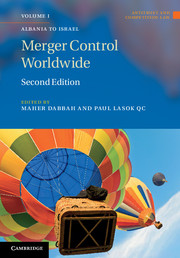Book contents
- Frontmatter
- Contents
- Preface
- List of Contributors
- Table of cases
- Table of Legislation and Official Guidance
- Introduction
- Albania
- Argentina
- Armenia (Republic of Armenia)
- Australia
- Austria
- Barbados
- Belgium
- Bosnia and Herzegovina
- Brazil
- Bulgaria (Republic of Bulgaria)
- Canada
- Chile
- China*
- Costa Rica
- Croatia
- Cyprus (Republic of Cyprus)
- Czech Republic
- Denmark
- Estonia
- European Economic Area
- European Union
- Finland
- France
- Germany (Federal Republic of Germany)
- Greece
- Hong Kong
- Hungary
- Iceland
- India
- Indonesia (Republic of Indonesia)
- Ireland
- Israel
- Italy
- Japan
- Kenya
- Korea
- Latvia
- Lithuania
- Macedonia (Republic of Macedonia)
- Malta
- Mexico
- Netherlands (The Netherlands)
- New Zealand
- Norway
- Pakistan
- Peru
- Philippines (Republic of the Philippines)
- Poland
- Portugal
- Romania
- Russia
- Serbia
- Singapore
- Slovakia (Slovak Republic)
- Slovenia
- South Africa
- Spain
- Sri Lanka
- Sweden
- Switzerland
- Taiwan
- Thailand
- Tunisia (Republic of Tunisia)
- Turkey
- Ukraine
- United Kingdom
- United States of America
- Uzbekistan
- Venezuela
- Zambia
- Index
Lithuania
Published online by Cambridge University Press: 05 November 2014
- Frontmatter
- Contents
- Preface
- List of Contributors
- Table of cases
- Table of Legislation and Official Guidance
- Introduction
- Albania
- Argentina
- Armenia (Republic of Armenia)
- Australia
- Austria
- Barbados
- Belgium
- Bosnia and Herzegovina
- Brazil
- Bulgaria (Republic of Bulgaria)
- Canada
- Chile
- China*
- Costa Rica
- Croatia
- Cyprus (Republic of Cyprus)
- Czech Republic
- Denmark
- Estonia
- European Economic Area
- European Union
- Finland
- France
- Germany (Federal Republic of Germany)
- Greece
- Hong Kong
- Hungary
- Iceland
- India
- Indonesia (Republic of Indonesia)
- Ireland
- Israel
- Italy
- Japan
- Kenya
- Korea
- Latvia
- Lithuania
- Macedonia (Republic of Macedonia)
- Malta
- Mexico
- Netherlands (The Netherlands)
- New Zealand
- Norway
- Pakistan
- Peru
- Philippines (Republic of the Philippines)
- Poland
- Portugal
- Romania
- Russia
- Serbia
- Singapore
- Slovakia (Slovak Republic)
- Slovenia
- South Africa
- Spain
- Sri Lanka
- Sweden
- Switzerland
- Taiwan
- Thailand
- Tunisia (Republic of Tunisia)
- Turkey
- Ukraine
- United Kingdom
- United States of America
- Uzbekistan
- Venezuela
- Zambia
- Index
Summary
RELEVANT LEGISLATION AND STATUTORY STANDARDS
Relevant legislation
Merger control was introduced into Lithuanian law with the enactment of the first Law on Competition on 15 September 1992. The original merger control rules have been significantly amended following adoption of the 1999 Law on Competition (‘the Law on Competition’), bringing the merger control regime closer to the European Union (EU) model, while the last significant reform of the merger control rules took place in 2004, aiming to respond to reforms launched by the new EU Merger Regulation.
The statutory rules establishing the control of mergers have been elaborated by the Competition Council of the Republic of Lithuania (‘Competition Council’), which on 27 April 2000 passed Resolution No 45 On Approval of the Procedure for Submission and Examination of Notifications of Concentrations and the Calculation of Aggregate Turnover (‘the Merger Resolution’).
Statutory standards
The merger control regime established by the Law on Competition applies to transactions falling within the concept of a ‘concentration’. According to Article 3(14) of the Law on Competition, ‘concentrations’ may be conducted in two forms:
a merger, in which one or more undertakings which terminate their activity as independent undertakings are combined with an undertaking that continues its operation, or when a new undertaking is established when two or more undertakings terminate their activity as independent undertakings; or
an acquisition of control, when one or more natural persons that exercise control over one or more undertakings, or an undertaking or several undertakings, acting on the basis of an agreement, jointly create a new undertaking or gain control over another undertaking by acquiring an enterprise or a part thereof, or all or a part of the assets of an undertaking, or its shares or other securities, voting rights, or by concluding contracts, or in any other manner.
- Type
- Chapter
- Information
- Merger Control Worldwide , pp. 910 - 922Publisher: Cambridge University PressPrint publication year: 2012
- 1
- Cited by



